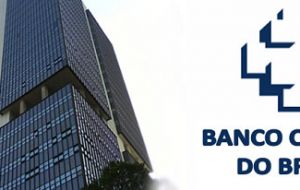MercoPress. South Atlantic News Agency
Brazil hits back at S&P; says economy is well positioned to new challenges in the global scenario
 The central bank and the Finance ministry poured out a long list of stats to counter S&P downgrade
The central bank and the Finance ministry poured out a long list of stats to counter S&P downgrade Brazil's central bank on Tuesday said it will continue to respond to challenges in the international scenario after Standard & Poor's decision to downgrade the country's credit ratings. This includes a rigorous set of macroeconomic policies, a flexible exchange rate regime and the use of liquidity buffers “to smooth out moves in asset prices” the bank said in a statement.
S&P late on Monday cut Brazil's credit rating to BBB minus, its lowest investment grade level, citing a deterioration in the country's fiscal performance and prospects of subdued economic growth in the coming year. However the outlook for the country remains stable.
Moody's Investors Service and Fitch Ratings both have investment-grade ratings on Brazil with stable outlooks.
The Central bank pointed out that an austere economic policy and a flexible exchange rate, plus the use of cushions that have been built up over time to try to smooth out bumps in global markets. The bank was referring to the over 360bn dollars in international reserves.
“With this, Brazil is well-positioned for this new phase of normalization in global financial conditions and is fully able to cope with them safely,” the central bank said, adding that investors have been sending money into Brazil in recent months, a reflection of the policies that have been adopted.
The Ministry of Finance also disagreed with S&P and said the lower rating is ”inconsistent with the conditions of the (Brazilian) economy“ and is contradicting faced ”with the solidity and those fundamentals“. Likewise even when the credit risk agency alleges that one of the reasons for its decision was subdued economic growth, ”it is important to underline that Brazil in the international crisis period which took off in 2008, expanded 17.8%, one of the highest accumulated growth rates of the G20 group” (of emerging and industrialized economies).-
Furthermore last year Brazil's GDP expanded 2.3%, 'a performance higher than that of most countries in the G20”. The ministry also rejected the alleged 'slips' in fiscal policy and pointed out that in 2013 the primary surplus was 1.9% of GDP, sufficient to reduce overall public debt both gross (from 58.8% of GDP to 57.2%) and net (from 35.3% of GDP to 33.8%).
Finally the Finance ministry recalls that foreign direct investment in the last twelve months to February totaled 65.8bn dollars and the infrastructure program “has earmarked 400bn dollars for coming years” and last but not least the Brazilian economy has “low external vulnerability because it holds the fifth highest level of international reserves among G20 members”.
Meanwhile, S&P defended the rating firm's decision to cut Brazil's credit rating and highlighted the need for the country to undertake major reforms if it is to attain higher levels of investment.
“It is important...to see if Brazil will go back to discussing fiscal reform, social security and tax reforms” after October's presidential election, Sebastian Briozzo, an S&P director, told reporters at an event in São Paulo on Tuesday. “It is hard to see how Brazil could increase investment in the short term without deeper reforms.”
“Our communication shows that [the downgrade] is the result of a comprehensive analysis, not one specific issue,” he said. “Of course, the fiscal situation is important.”
Brazil was two notches above investment grade and needed much stronger economic policies to remain at that level, he said. “Still, it is important to highlight that the outlook is now stable. We still see Brazil as an investment-grade economy,” he underlined.




Top Comments
Disclaimer & comment rules-

-

-

Read all commentsThis retort, for that is what it is, smacks of desperation and completely omits any positive statement for the future.
Mar 26th, 2014 - 11:28 am 0“We disagree with this downgrade and will prove our fiscal strength in the coming months” would have been better.
Was the “minister” not aware that Brazil’s money market was expecting this, but not the timing?
So, another liar or another incompetent or both.
In my opinion the risk score should be ZZZ-
Mar 26th, 2014 - 12:00 pm 0Only those who use the rating are the speculators. Or who need dollar.
Brazil needs of agricultural and industrial production.
What remains belongs to the pale-faces of Wall Street and their cronies.
https://www.youtube.com/watch?v=z3-VeOjMj4U
2. If that were the case your country wouldn't be consistently depreciating your currency.
Mar 26th, 2014 - 12:20 pm 0You can't depreciate your way to prosperity
My guess is the rolling blackouts will drive you into recession soon.
Commenting for this story is now closed.
If you have a Facebook account, become a fan and comment on our Facebook Page!